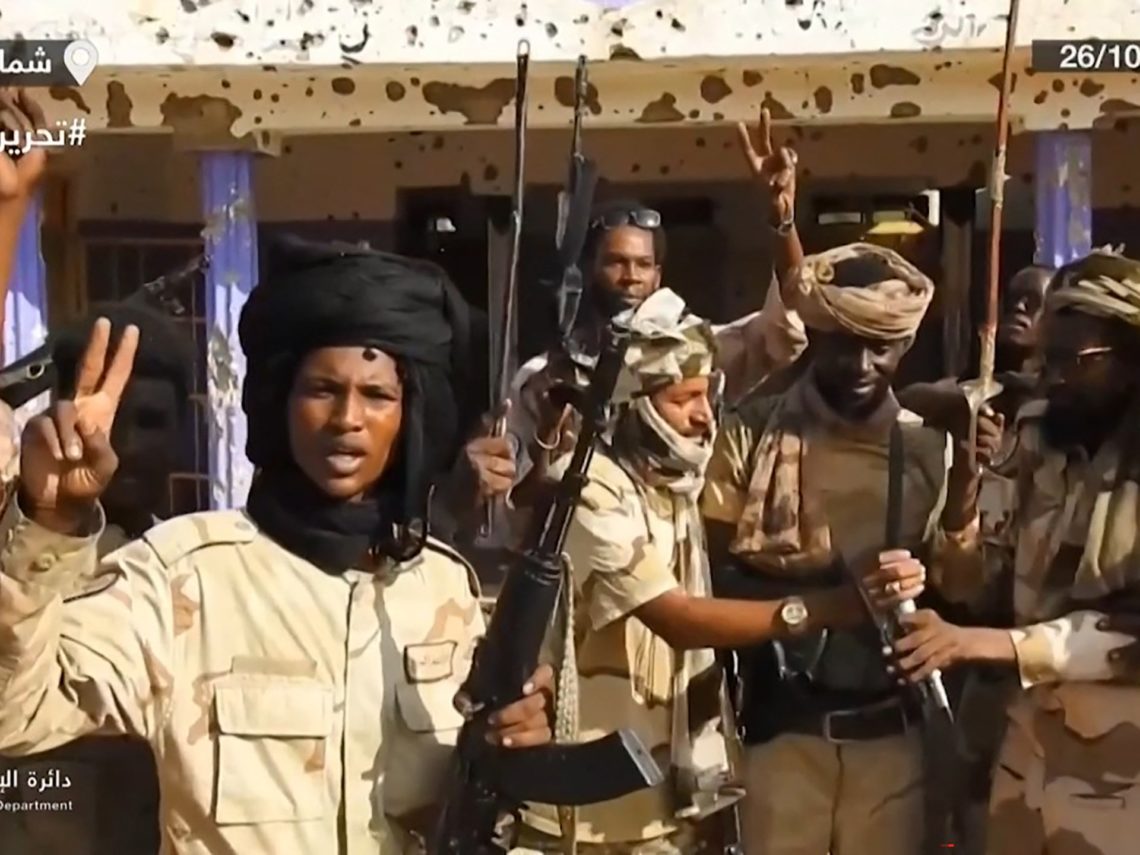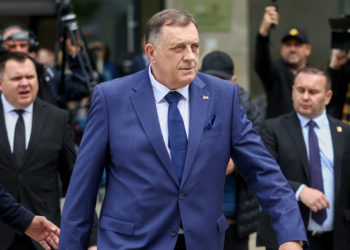Ben Rhodes, a former United States deputy national security adviser under President Barack Obama, famously called Washington’s foreign policy establishment “the Blob” to describe its entrenched ecosystem of think tanks, former officials, journalists and funders that perpetuate a narrow vision of power, global order and legitimate actors. This apparatus not only sustains conservative inertia but also defines the limits of what is considered possible in policy. In Sudan’s two-and-a-half-year conflict, these self-imposed boundaries are proving fatal.
A particularly insidious practice within the Blob is the invocation of moral and rhetorical equivalence, portraying the Rapid Support Forces (RSF) and the Sudanese armed forces (SAF) as comparable adversaries. This ostensibly balanced US stance, evident in establishment analyses and diplomatic statements, represents not an impartial default but a deliberate political construct. By equating a criminalised, externally backed militia with a national army tasked with state duties, it sanitises RSF atrocities, recasting them as mere wartime exigencies rather than orchestrated campaigns of ethnic cleansing, urban sieges and terror.
Reports from Human Rights Watch on ethnic cleansing in West Darfur, civilian killings, rape and unlawful detentions in Gezira and Khartoum and United Nations fact-finding missions confirm the RSF’s deliberate targeting of civilians. Furthermore, a report by the Armed Conflict Location & Event Data (ACLED) monitor from late 2024 attributed roughly 77 percent of violent incidents against civilians to the RSF, underscoring this asymmetry, yet the Blob’s discourse frequently obscures it.
This notion has dominated US and international discourse on Sudan’s war since its outbreak when the then-US ambassador to Khartoum, John Godfrey, tweeted in the first month of the war a condemnation of RSF sexual violence but vaguely attributed it to unspecified “armed actors”. By refraining from explicitly identifying the perpetrators despite extensive documentation of the RSF’s responsibility for systematic rapes, gang rapes and sexual slavery, his wording essentially dispersed accountability across the warring parties and contributed to a climate of institutional impunity. RSF militiamen carry out their atrocities with confidence, knowing that responsibility will be blurred and its burden scattered across the parties.
What drives this equivalence? The Blob’s institutions often prioritise access over veracity. Framing the conflict symmetrically safeguards diplomatic ties with regional allies, particularly the RSF’s patrons in the United Arab Emirates while projecting an aura of neutrality. However, neutrality amid asymmetric criminality is not objectivity; it is tacit complicity. Elevating an internationally enabled militia to parity with a sovereign military confers undue legitimacy on the RSF, whose methods – including the besieging and starving of cities such as el-Fasher, the systematic use of rape and sexual violence as a weapon of war, the deployment of drones against mosques and markets, and acts of genocide – are demonstrably systematic, as corroborated by investigative journalism and human rights documentation. To subsume these under “actions by both parties” distorts empirical reality and erodes mechanisms for accountability.
Compounding this is the Blob’s uncritical assimilation of RSF propaganda into its interpretive frameworks. The RSF has strategically positioned itself as a vanguard against “Islamists”, a veneer that conceals its historical criminal nature, patronage networks, illicit resource extraction and foreign sponsorship.
In a similar vein, the RSF has publicly expressed sympathy and strong support for Israel, even offering to resettle displaced Palestinians from Gaza in a bid to align with US interests. This discourse serves as an overture to the Blob, leveraging shared geopolitical priorities to portray the RSF as a pragmatic partner in regional stability.
Certain establishment pundits and diplomats have echoed this narrative, casting the RSF as a viable bulwark against an “Islamist resurgence”, thereby endowing a force implicated in war crimes with strategic and ethical credibility. When the Blob internalises this “anti-Islamist” trope as analytical shorthand, it legitimises an insurgent militia’s rationalisations as geopolitical truths, marginalising the reality of the war and the Sudanese who repudiate militarised binaries and sectarian lenses.
Contrast this with the recurrent accusations of external backing for the SAF from an ideologically disparate coalition, including Egypt, Turkiye, Saudi Arabia and Iran. These claims, often amplified in mainstream media narratives and aligning with RSF discourse, expose profound inconsistencies: Egypt’s secular anti-Islamist state, Turkiye’s Islamist-leaning government, Saudi Arabia’s Sunni Wahhabi monarchy and Iran’s Shia theocracy embody clashing regional rivalries, evident in proxy wars from Yemen to Libya, rendering their purported unified support for the SAF implausible unless opportunistic pragmatism overrides ideology.
Moreover, the evidentiary threshold falls short of the robust, independent documentation implicating the UAE in RSF operations, relying instead on partisan assertions and circumstantial reports that appear designed to muddy asymmetries. Critically, any verified SAF assistance typically involves conventional arms transactions with Sudan’s internationally recognised government in Port Sudan, a sovereign authority, as opposed to the unchecked provisioning extended to the RSF, a nonstate actor formally designated by the US as genocidal. This fundamental distinction highlights the Blob’s contrived equivalence, conflating legitimate state-to-state engagements with the illicit empowerment of atrocity perpetrators.
Even more corrosive is the Blob’s propensity to credential “pseudo-civilian” entities aligned with the RSF and its external sponsors, particularly those bolstered by UAE influence, such as Somoud, led by former Prime Minister Abdalla Hamdok, who also chairs the Emirati business-promotion organisation, the Centre for Africa’s Development and Investment (CADI). These networks are often presented in Blob forums as “civilian stakeholders” or “pragmatic moderates”, sidelining authentic grassroots entities inside Sudan.
This curation of externally amenable proxies transforms mediation into theatre, channelling international validation towards RSF-aligned gains and ignoring Sudanese agency rather than supporting any real civic architects of Sudan’s democratic aspirations. Documented UAE-RSF logistical and political linkages alongside Gulf-orchestrated narrative amplification should serve as a warning against endorsing such fabricated authority.
These lapses are not merely intellectual; they yield tangible harms. Legitimising the RSF through equivalence or narrative cooption dilutes legal and political tools for redress, confining policy options to performative ceasefires and superficial stability blueprints that preserve war economies and armament flows. It defers genuine deterrence, such as targeted interdictions, robust arms embargoes and the exposure of enablers until atrocities become irreversible.
The repercussions do not end there. They deepen, fuelling the militia’s authoritarian ambitions in alliance with its civilian partners. Drawing on this contrived equivalence, they have recently declared Ta’asis, parallel governing structures in western Sudan, claiming a layer of legitimacy while, at least rhetorically, brandishing the threat of partition despite the clear international consensus against recognising such authority.
To counter the Blob’s pathologies, a paradigm shift is imperative. Analysts and policymakers must abjure false symmetry, distinguishing symmetric warfare from asymmetric atrocity campaigns. Where evidence is found of systematic rights abuses, international rhetoric and actions should reflect this imbalance through targeted sanctions and disruptions while avoiding generic “both-sides” statements.
They must also repudiate RSF narratives. The “anti-Islamist” rhetoric is partisan sloganeering, not objective analysis. US engagement should centre on civilian protection, privileging authentic civil society testimonies over manufactured proxies. The question of who governs Sudan is, first and foremost, the prerogative of the Sudanese people themselves, who in April 2019 demonstrated their sovereign agency by toppling Omar al-Bashir’s Islamist regime without soliciting or relying on external assistance.
Equally important is to withhold recognition from contrived civilians. Mediation roles should hinge on verifiable grassroots mandates. Entities tethered to foreign patrons or militias merit no elevation as Sudan’s representatives.
Finally, policymakers must dismantle enablers. Rhetorical and legal measures must be matched by enforcement through transparent embargo oversight, flight interdictions and sanctions on supply chains. Justice without implementation offers only solace to victims.
Should the Blob prove intransigent, alternative forces must intervene. Sudanese civic coalitions, diaspora advocates, independent media and ethical policy networks can amass evidence and exert pressure to compel a recalibration of global approaches. A diplomacy that cloaks complicity in neutrality perpetuates atrocity machinery. Only one anchored in Sudanese agency, empirical truth and unyielding accountability can forge a viable peace.
Sudanese seek no sympathy, only a recalibration among the influential: Cease equating aggressors with guardians, amplifying perpetrator propaganda and supplanting vibrant civic realities with orchestrated facades. Until Washington’s elite perceives Sudanese not as geopolitical subjects but as rights-bearing citizens demanding justice, its epistemic maze will continue to license carnage over conciliation.
The views expressed in this article are the author’s own and do not necessarily reflect Al Jazeera’s editorial policy.
The post Washington’s ‘Blob’ is helping whitewash Sudan’s war crimes appeared first on Al Jazeera.




